Weebly Alternatives: The 5 Best Options To Try in 2025
If you click to purchase a product or service based on our independent recommendations and impartial reviews, we may receive a commission. Learn more
With its free plan and easy-to-use editor, Weebly is a well-known website builder used by over 50 million sites around the world. But how does it compare to website builder competitors?
Since builders like Wix and Squarespace have made great strides in recent years, constantly developing new and improved features for its users, Weebly has struggled to keep up with them. This is especially true after Weebly merged with Square in 2018, neglecting its website builder and shifting its focus on its new ecommerce platform instead. With that said, it may be time to think of some Weebly alternatives.
Looking for the best creative portfolio? Need to scale up your business? Whatever you need, one of these alternatives to Weebly could be the right fit for you and your unique needs.
5 Best Weebly Alternatives
- Wix – For the best, all-around features
- Squarespace – For creatives showcasing their work
- Shopify – For larger online stores
- GoDaddy – For speedy set up times
- Hostinger – For specialized AI tools
Weebly Alternative #1: Wix
5 out of 5 stars
- Overall rating: 4.9/5
- Read our Wix vs Weebly comparison
Out of all the website builders on the market, Wix is the best Weebly alternative thanks to its extensive range of website features. With SEO support, email marketing tools, and a busting app store, you’ll be equipped with all of the tools necessary to create a professional page for your business.
Before we look at Wix’s features in more detail, here are its key pros and cons:
Wix Pros
✅ Wide range of website features
✅ 800+ website templates
✅ Strong customization options
Wix Cons
❌ Can’t switch website templates once live
❌ The editor can be overwhelming
❌ Steep price jumps between plans
What Are the Differences Between Weebly and Wix?
With Wix, you’ll have access to a much wider range of website features allowing you to create a website that does everything you want it to. Weebly, on the other hand, hasn’t updated its builder’s features much in recent years, especially after the merger with Square.
Here are a few of Wix’s key features to look out for:
- Wix App Market: Over 500 apps paid and free apps for your website, covering marketing, ecommerce, and design.
- Wix’s scheduling tool helps you manage bookings from your website. If you’d like to accept bookings and payments, you’ll need to be on the Wix Business Premium plan.
- Ecommerce functionality: Wix provides users with a range of features that’ll help with selling, such as abandoned cart recovery emails and point of sale for in-person transactions.
- Built-in SEO tools: Upgrade your SEO strategy by customizing meta tags, meta descriptions, and alternative text, alongside integrating with Semrush.
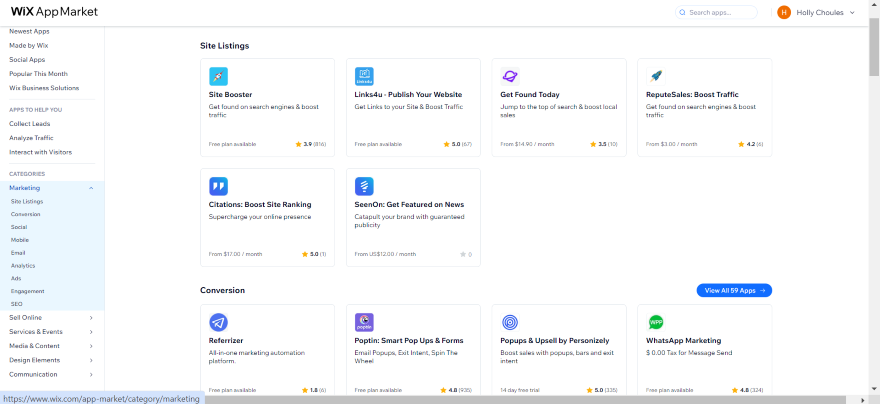
Templates and Design
Wix editor gives you more creative control over your website than Weebly does, you’ll find plenty of options allowing you to customize your website how you see fit. Areas it particular excels in are:
- Template choice: Choose from over 800 professional Wix templates covering a variety of industries.
- Drag-and-drop editor: Wix’s editor extremely beginner friendly and grants more design freedom than Weebly’s limited block-based editor.
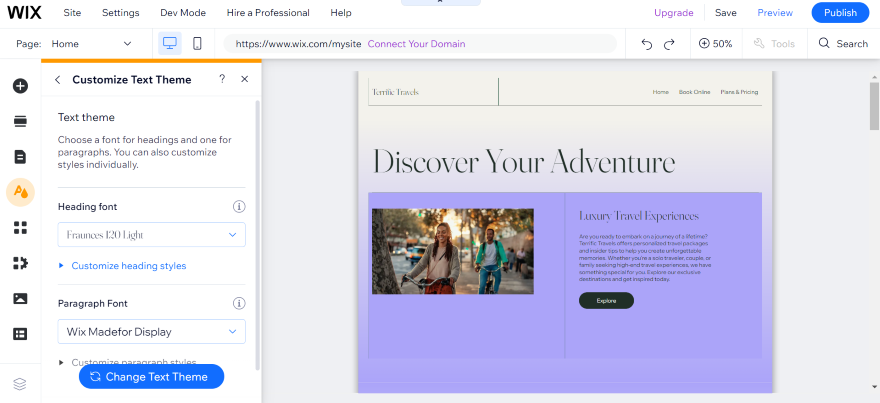
Wix’s Limitations
However, with such a wide range of design tools available, you may find Wix’s editor overwhelming to use and that it takes quite some time to work out where everything is. If that worries you, we recommended Squarespace’s editor instead since it’s the easiest one to use.
Another limitation to be aware of is that, once your Wix site is live, you won’t be able to switch templates. If you want to switch your templates seasonally, or are in the early stages of brand development, I’d recommend using a builder with flexible templates and automatic reformatting, such as GoDaddy.
How Much Does Wix Cost?
- Free plan
- 14-day money back guarantee
- 10% off all plans with code “TAKE10”
Wix’s pricing ranges from $17 per month to $159 per month, when billed annually. There are four different premium plans to choose from:
- Light: $17 per month
- Core: $29 per month
- Business: $39 per month
- Business Elite: $159 per month
Each plan comes with storage space, marketing tools, and the ability to add collaborators. Though if you need to access site analytics or use ecommerce, you’ll have to pay for the Core plan.
At a glance, the price jump from $17 to $159 per month is expensive, so you might want to consider a more affordable website builder (like GoDaddy or Hostinger) if you’re building a website on a budget.
Wix also has one of the best free website builder plans on the market. Still, it’s important to note that it still comes with limitations, such as:
- Wix ads across your site
- A wixsite URL
This can make your website look unprofessional to visitors, since the Wix name will be visible and can take away from your business’ own branding.
Weebly Alternative #2: Squarespace
5 out of 5 stars
Overall rating: 4.8/5
If you feel limited by Weebly’s standard website templates, then you’ll want to check out Squarespace’s offering instead, especially if you’re in a creative industry. Since Squarespace is passionate about providing users with design-centric templates, you’ll find sleek, modern designs you can tweak to reflect your unique creative identity.
Squarespace also offers the easiest editor to use, scoring 5 out of 5 in our ease of use testing due to how simple it is to change the colors, fonts, and other design elements of your website. You won’t have to worry about picking up a complicated system right off the bat.
Listed below are Squarespace’s key pros and cons to keep in mind:
Squarespace Pros
✅ The price plans are good value for money
✅ Easy-to-use editor
✅ Stylish and unique templates
Squarespace Cons
❌ No free plan
❌ Limited app store for extra functionality
❌ Weaker sales features than competitors
What Are the Differences Between Weebly and Squarespace?
Squarespace has the best design features of all the websites we tested. Its focus on high-quality, eye-catching templates makes Weebly’s designs appear a little outdated in comparison. Here’s what stands out about Squarespace’s templates:
- Range: After signing up for Squarespace, I was able to explore professional templates spanning categories such as real estate, gaming, photography, restaurants
- Functionality: I was able to narrow down the templates via the search filter, allowing me to organize results by industry and the exact features I wanted my design to have
- Drag-and-drop editor: Squarespace is the easiest editor I’ve used, and I could add and customize a range of content blocks to my website, such as sign up forms and accordions.
- Handy grid overlay: The editor provides grid guidelines to help you move blocks around without messing up your design.
In comparison Weebly’s poor mobile formatting and restrictive editor limit how much you can customize templates. Squarespace an excellent alternative if you’re keen to create a stylish website for visitors.
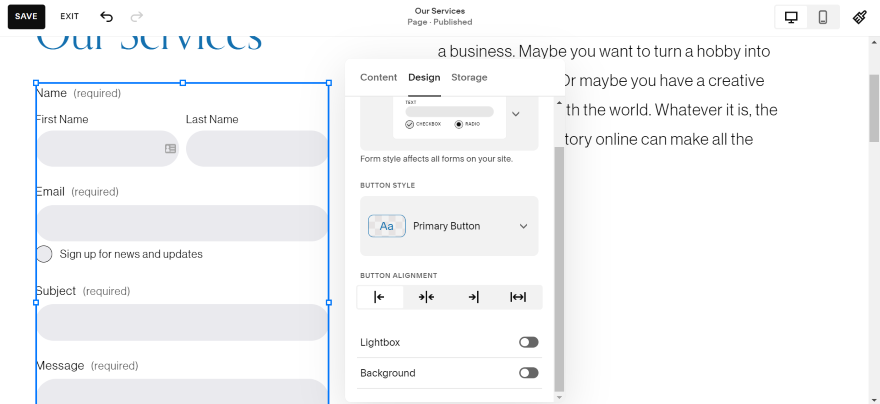
Spacespace’s Limitations
Squarespace’s app store offers a very small selection of extensions, which limits how much you can tailor can your site to your needs. In comparison, Shopify has over 8,000 apps to choose from, covering almost any website need.
How Much Does Squarespace Cost?
- No free plan
- 14-day free trial
- 10% off all plans with code “WBE10”
Squarespace’s pricing ranges between $16 per month and $99 per month, when billed annually. There are four plans to choose from:
- Basic: $16 per month
- Core: $23 per month
- Plus: $39 per month
- Advanced: $99 per month
With each plan, you’ll receive key features, such as unlimited bandwidth, SEO tools, and a free custom domain name. You can also sell your products or services online with any Squarespace plan.
Though Weebly’s cheapest plan is only $10 per month, making it more affordable overall, the features you receive will be more limited. You won’t get unlimited storage space or have the ability to remove ads from your webpage.
Weebly Alternative #3: Shopify
4.5 out of 5 stars
Overall rating: 4.5/5
Is the main purpose of your website to sell products online? If that’s the case, then you’ll want to try out Shopify’s powerful ecommerce website builder.
Although Weebly has its own ecommerce option that is powered by Square, Shopify’s wider range of sales features, like different shipping and payment options, means you’ll be able to easily scale up your store and keep track of a large inventory.
Weebly is suitable for smaller stores, but it doesn’t support longer-term growth like Shopify does. That’s why we recommend Shopify for fast-growing stores because it provides you with the tools you’ll need to sell a high volume of products.
Before you learn more about Shopify, here are its key pros and cons:
Shopify Pros
✅ Strongest ecommerce features
✅ Strong inventory management tools
✅ Extremely secure builder
Shopify Cons
❌ Steep price hikes between plans
❌ Extra third-party apps are necessary
❌ Limited free templates
What Are the Differences Between Weebly and Shopify?
Shopify’s ecommerce platform is designed specially for merchants to set up and scale their online store; which sets it apart from Weebly from the outset. Our research found Shopify to have the best sales features overall. Some of the most significant include:
- Multiple shipping options that include four different couriers: FedEx, USPS, UPS, and DHL express. You can also use Shopify Shipping to print off discounted shipping labels and save money
- POS: After purchasing Shopify’s POS hardware, you’ll be able to accept in-person payments, sell your products anytime, anywhere, and sync your digital and brick-and-mortar sales
- Abandoned cart recovery: Shopify will send out an automatic email to users that have left products in their cart to persuade them to go through with the purchase
- App Market extensions: Over 8,000 apps that’ll help with sales
- Strong inventory management tools: Makes it easy to keep track of a large variety of products, unlike Weebly’s basic inventory tools
- Global selling tools: Shopify offers multi-currency support and international shipping tools helping you manage global rates and custom fees
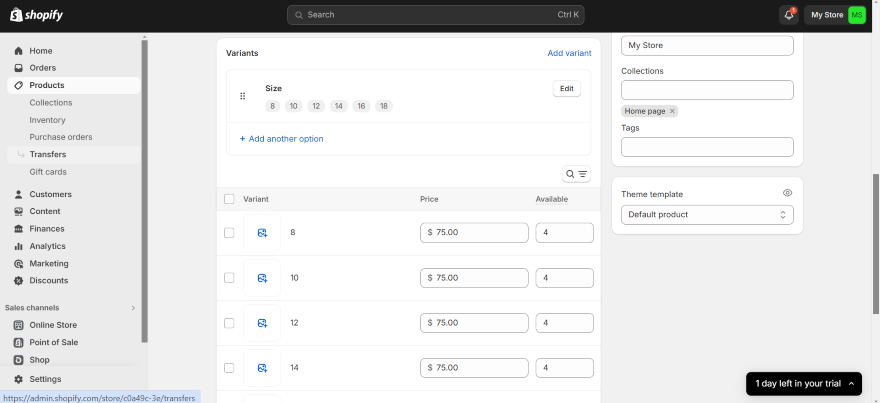
With the latest Shopify Editions Winter ‘24, the platform added even more inventory management tools to help you track your products effectively. Among the new additions, Shopify improved the ability to display multiple product variants, increased bundles from 10 products to 30 products, and lets you pick different inventory locations based on the regional marketplaces you’re selling in.
Shopify Limitations
Shopify relies a lot more on third-party apps than competitors like Wix. While these help you customize your store to fit your needs, the additional costs can add up over time, so be careful there.
Another cost to watch out for is templates, which Shopify only provides 23 of for free. Otherwise, you could be spendng upwards of $100 on your store theme. If you’re on a budget, I recommend a builder like Wix, which offers more than 2,000 free themes.
How Much Does Shopify Cost?
Shopify’s three plans range from $29 to $299 per month, when billed annually:
- Basic: $29 per month
- Grow: $79 per month
- Advanced: $299 per month
In comparison to other website builders on the market, Shopify’s pricing can get costly, especially when switching to the more advanced plans.
Despite the high price points, I recommend Shopify if you’d like to migrate from Weebly and expand your business, or have a large number of products to sell. All of its key sales features will give you room to scale up and make a profit.
Weebly Alternative #4: GoDaddy
4.5 out of 5 stars
Overall rating: 4.4/5
If you’re new to website building, setting up can seem like a daunting task. However, if you’re a small business who needs help with the entire process, we recommend GoDaddy’s website builder. Its combined customer support, seamless website generator tool, and beginner-friendly editor makes it a good fit for anyone just starting out.
Be sure to read GoDaddy’s pros and cons below if you’d like a general overview of the platform:
GoDaddy Pros
✔️ Best value for money
✔️ Beginner friendly interface
✔️ Fast setup with the AI website builder
GoDaddy Cons
❌ Website designs can look generic
❌ Basic sales tools
❌ Restricted customization
| GoDaddy Pros | GoDaddy Cons |
|---|---|
| GoDaddy’s plans are good value for money in comparison to competitors like Shopify and Wix, with plans starting from $9.99/mo. | Although it’s easy to generate a website with GoDaddy, the designs can tend to look generic – especially in comparison to other builders like Squarespace or Wix. |
| If you’re a beginner, you’ll find GoDaddy more accessible than other builders. You have access to 24/7 support for any questions, alongside easy-to-follow help resources. | GoDaddy’s ecommerce tools aren’t that powerful, with competitors like Shopify offering stronger features. You’ll need to look into other website builders if you want to scale up an online store. |
| To cut down your setup times, you can use GoDaddy’s AI generator. It lets you create a new website in under 30 seconds. | You may find GoDaddy’s editor restrictive due to its minimal customization options, so look elsewhere if you’d prefer to have more creative control over your website’s design. |
What Are the Differences Between Weebly and GoDaddy?
With GoDaddy, you’ll be able to set up your website fast, even if you’re lacking knowledge in the tech or coding department. Designed to be user-friendly for beginners, GoDaddy will lead you through the entire process and leave you with a professional page that represents your business well.
GoDaddy’s ADI editor plays a huge part in making designing a website easy. The tool will ask you key questions on your desired website, such as the industry you’re in, and then will get to work and design a website for you. According to our research, the process can be completed in under 30 seconds. So, even if you’re a beginner, GoDaddy will sort out the more technical parts of the process for you.
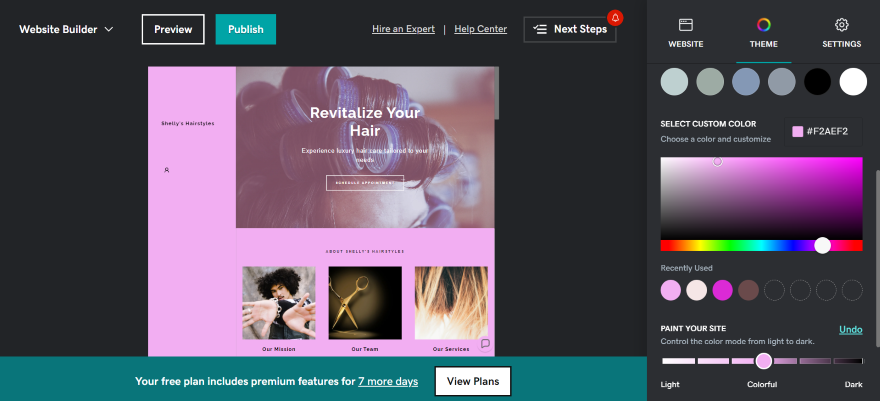
Once your website is loaded, you’ll have a few customization options to play around with. This includes inserting different elements onto your page, or playing around with the color, fonts, and different theme variations until you’re happy with the finished product. However, these tools aren’t as extensive as the ones you’ll find with Wix or Squarespace, so try out those website builders if you want more creative control.
If you encounter any mishaps along the way, GoDaddy also provides multiple phone lines and a 24/7 live chat. This makes it easy for beginners and small businesses to receive the help they need if they get stuck. Alongside this support, you can also access useful materials from GoDaddy’s knowledge base and community forums.
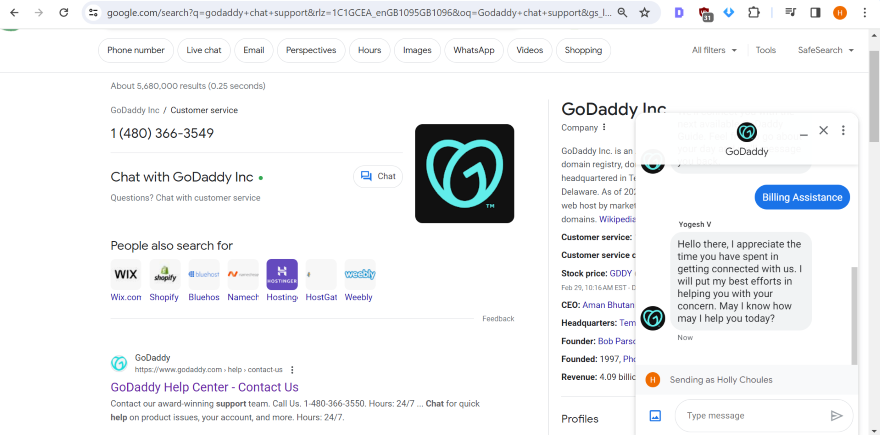
How Much Does GoDaddy Cost?
- Free plan
GoDaddy’s pricing plans range from $9.99 per month to $20.99 per month, when billed annually. There are four options to choose from:
- Basic: $9.99 per month
- Premium: $14.99 per month
- Commerce: $20.99 per month
On top of these affordable plans, GoDaddy also has a free plan, which is great if you want to test out some key features.
It’s a great price point for beginners, alongside small businesses who want a professional page on a budget. Even on the cheapest plan, you’ll receive key features like:
- An SSL certificate for security
- Marketing tools and analytics
- The ability to create and publish custom videos
- GoDaddy Studio tool assisting you with content creation
Though Weebly’s first paid plan is slightly cheaper at only $10 per month, I recommend switching to GoDaddy if you want a better range of features at a reasonable cost. GoDaddy’s plans seamlessly integrate with other GoDaddy services, including email marketing and domain registration.
Weebly Alternative #5: Hostinger
4.5 out of 5 stars
Overall rating: 4.2/5
When building your ideal website, we understand how time consuming it can be to create content for each page. Because of this, we recommend Hostinger’s website builder if you want to save time. Thanks to its dedicated AI features, you can take a hands-off approach to content creation and let the tools do all of the heavy lifting.
Weebly, which doesn’t have any AI features, focuses on a more manual website building experience where you’ll have to do most of the work yourself. Because of this main difference, we recommend Hostinger if you’re interested in AI and would like to use specialized tools to generate content for your website.
Ahead of exploring Hostinger’s AI website builder in more detail, here are a few pros and cons to mull over:
Hostinger Pros
✔️ Cheapest website builder we’ve tested
✔️ Fastest site loading speed
✔️ Wide range of AI content creation tools
Hostinger Cons
❌ No free plan
❌ Weak website marketing tools
❌ No app market
What Are the Differences Between Weebly and Hostinger?
Hostinger is the second easiest website builder to use. Thanks to its AI website builder and AI content creation tools, the setup process is simple and quick. Contrastingly, Weebly doesn’t utilize AI tools, so has a much more hands-on approach.
During Hostinger’s AI setup, you’ll have three key prompts to answer: your business name, the type of website you need, and a brief description of what your brand offers. Once you’ve filled in these key details, Hostinger’s AI will design your website.
If you’re not 100% happy with the finished product, you will be able to tweak your design afterwards by editing images and changing the font. However, your customization options will be limited – for greater creative control, opt for a more stylized website builder like Squarespace instead.
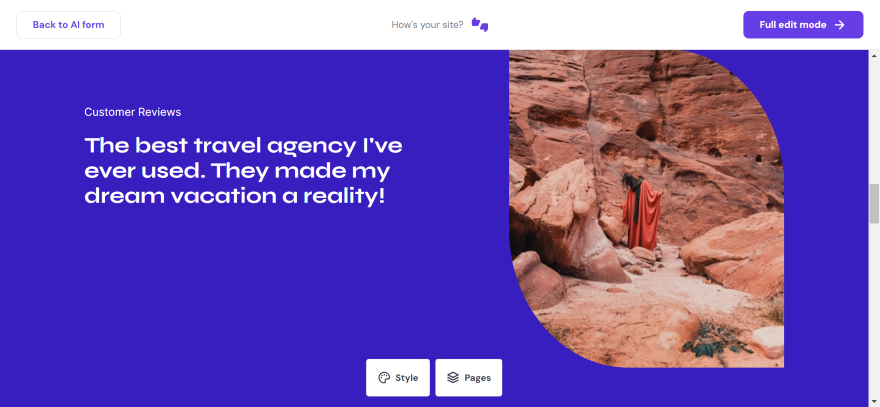
Of course, Hostinger has other AI tools you can explore, such as:
- AI image generator: Create vibrant images for your webpage
- AI content generator: Draft text for your website
- AI Logo Maker: Create a business logo
- AI SEO support: Offers guidance to improve your website’s online visibility
➡️Check out Hostinger’s full range of AI tools in our Hostinger review
Hostinger’s Limitations
One of Hostinger’s biggest limitations is that it has no app store. For growing online stores with diverse needs, this limits its scalability considerably. For these websites, I recommend using Wix instead, since it can be tailored to a wide range of businesses.
Hostinger’s promotional tools are also weak, lacking features key to growth, such as social media scheduling and marketing features.
How Much Does Hostinger Cost?
- No Free plan
- Save 10% on any plan with code “WBE”
Hostinger’s pricing is definitely one of its strong points, with two website builder plans:
- Premium Website Builder $2.99 per month
- Business Website Builder: $3.99 per month
Contrasting other website builders on the market who have increased its prices over time, Hostinger’s main plans remain affordable. Just be aware that these plans are spread across longer contracts that range from 12 to 48 months.
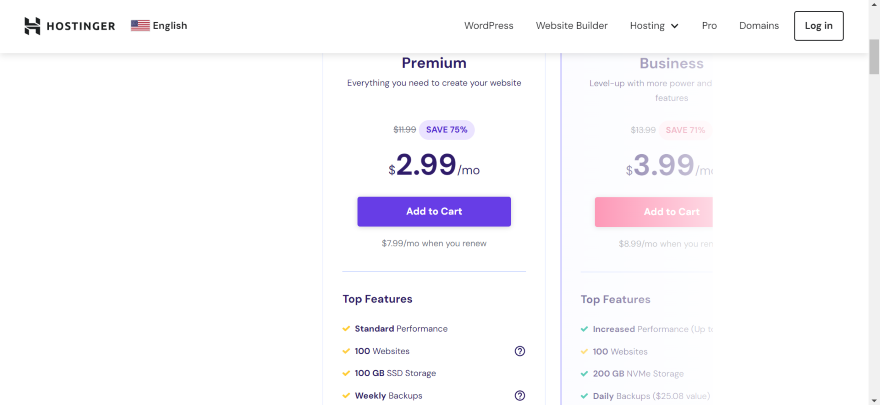
Hostinger’s cheapest plan is only $2.99 per month and is spread across a longer billing cycle of 48 months – ideal if you have a strict budget and want to keep your monthly costs to a minimum.
Additionally, the plan comes with essential features, such as:
- A free domain
- Unlimited bandwidth
- 24/7 customer support
- The ability to create up to 100 websites if needed
Not everyone will want to sign up to a long term, 48-month plan. If that’s the case, you could opt for another deal instead. To pay across a 12 month period on the Premium plan, you’ll only need to pay $3.19 per month which is still great value for money.
How Easy Is It To Migrate From Weebly?
Weebly doesn’t make it easy to switch to other platforms. When it comes to your new platform, you won’t be able to import all of your previous website’s features, like its specific layout or theme, into your new website. Also, if you have text to move over (i.e from a blog), you will need to copy and paste this content into your new pages.
However, if you know that changing to another platform will improve your website’s quality overall, the switch will be worth the effort. Remember to back up your content before you start making the switch and save as much as you possibly can.
Buying Guide: What To Look for in a Website Builder
To help you decide, which Weebly alternative is best, it’s worth considering:
- Why you’re interested in another platform
- What features you’ll need to succeed online
We’ve put together a few pointers below so you can evaluate each alternative based on your unique needs.
- What do you like about Weebly? What key features does Weebly already have that you want in your next platform? For instance, if you enjoy integrating extensions from the app store, then it’s worth considering a platform like Wix or Squarespace instead.
- What do you dislike about Weebly? Is Weebly lacking something you desperately need? This could include its limited scalability for online stores, making Shopify a better option.
- What features do you need to keep? Before you switch, you’ll need to ensure that the platform you’ve picked has the key features your website still needs. As an example, we wouldn’t move to Hostinger if you enjoy using Weebly Promote’s in-built email marketing tool.
Know Your Priorities
Once you’ve asked yourself these key questions, it’s time to decide which website features you want the most based on your unique needs. These key factors below will give you a head start:
Limited knowledge of website builders? Look for:
- Easy-to-follow resources or tutorials
- Prompt assistance from 24/7 customer support
- An intuitive editor you can pick up easily
Is your main goal to sell products or services? Look for:
- Inventory management that can support a large quantity of products
- Varied payment methods
- Multiple shipping options
- Scheduling tools so you can set up meetings with potential clients
Is your budget limited? Look for:
- Free features, such as free themes or free extensions
- Fairly priced plans that include the key features needed to set up
- Regular special offers
- Low transaction fees
Need to set up fast? Look for:
- AI website builders designed to generate your pages within seconds
- Speedy customer support for quick answers
- Pre-built templates so you can spend less time on design
If you’re still unsure, why not try our quick quiz to receive a personalized recommendation?
How We Tested Each Website Builder
To make sure you find the best alternative to Weebly, we examined each platform through the lens of our rigorous website builder research. This research included hands-on testing of each platform, meaning we can share our experience of the ins and outs of each competitor on this list.
We carried out over 300 hours of research across six key criteria:
- Website Functionality
- Design Features
- Pricing
- Help and Support
- User Experience
- Reputation
The results of our testing have influenced our recommendations on this page, so we can help you pick out the best website builder that’s tailored to your unique needs.
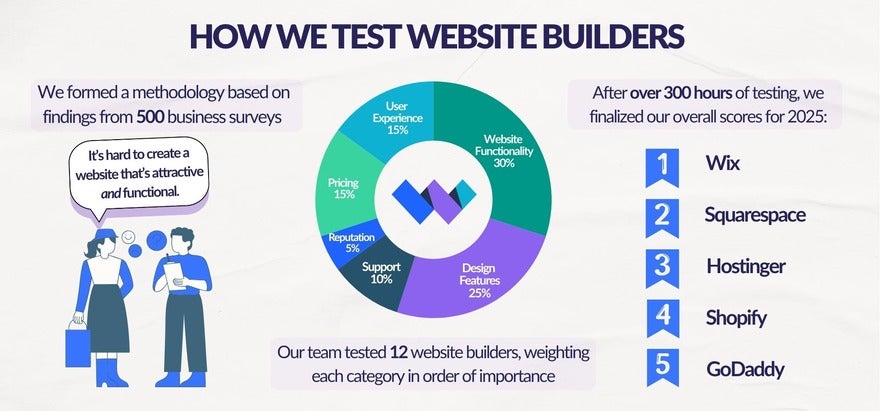
Weebly Alternatives Summary
Based on the research above, it’s clear that Wix is the best alternative to Weebly. Suitable for a variety of markets and niches, Wix is the best overall website builder because of the creative freedom it gives users, the wealth of features offered, and its ecommerce functionality – all of these positives contribute to Wix’s strong 4.9 out of 5 score overall in our research.
Although Wix is the best Weebly alternative overall, that doesn’t mean any of the other website builders listed won’t be a good fit for you. These platforms could also be a suitable choice based on what you’re looking for. Here’s a quick round-up of each option and who they’re best suited to:
- Squarespace: If you’re a creative who wants to showcase their work in style, then Squarespace is your best bet. Its design-centric templates and stylish customization options will help you set up a website that best suits your aesthetic tastes.
- Shopify: Are you a business with plans to scale up your online store? If that’s the case, then Shopify’s sales features and great inventory management tools will allow you to sell your products around the world.
- GoDaddy: The best website builder for beginners who want to build a website fast, GoDaddy’s speedy website generator and 24/7 customer service offers a straightforward experience that keeps set up times to a minimum.
- Hostinger: Thanks to its extensive AI tools, Hostinger offers a seamless, hands-off approach to website building. This is suitable for anyone interested in this exciting tech who wants to easily generate content for their website.

Leave a comment